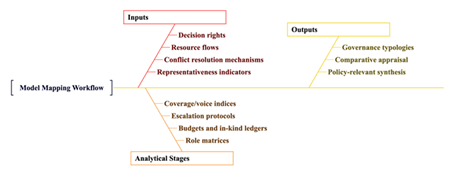Remote Collaboration Governance Models for Partnership Effectiveness in Hygiene Promotion
Main Article Content
Abstract
This paper presents a theory-led framework to map and evaluate remote governance for co-developing hygiene-promotion interventions in urban informal settlements. Remote collaboration can broaden participation but depends on trust, intermediaries, and constrained connectivity. The governance gap concerns how to allocate decision rights and resources, preserve accountability, and resolve conflicts when face-to-face coordination is limited and power asymmetries persist. We operationalize decision rights, resource flows, conflict resolution, and representativeness into role matrices, budgets and in-kind ledgers, escalation protocols, and coverage/voice indices, and compare centralized hubs, distributed consortia, participatory virtual platforms, and hybrids. Alignment between stakeholder priorities and design is quantified using the Jaccard similarity index (JSI) and triangulated with indicators including decision latency, resource-flow fidelity, stakeholder inclusion index, and operational resilience; sensitivity analyses vary digital access and funding continuity. Results indicate networked consortia often minimize decision latency but diffuse authority, participatory platforms typically improve alignment where trust and institutional capacity are strong, and hybrids balance resource efficiency with conflict responsiveness under time pressure; uncertainty widens with weak monitoring and uneven access, so causal claims are not made. The contribution is an integrated, results-grounded appraisal that clarifies trade-offs and links indicators to policy levers. The framework enables Non-Governmental Organizations (NGOs) and public partners to select context-appropriate configurations and set measurable decision-rights and equity safeguards under bandwidth and time constraints.
Article Details

This work is licensed under a Creative Commons Attribution-ShareAlike 4.0 International License.

